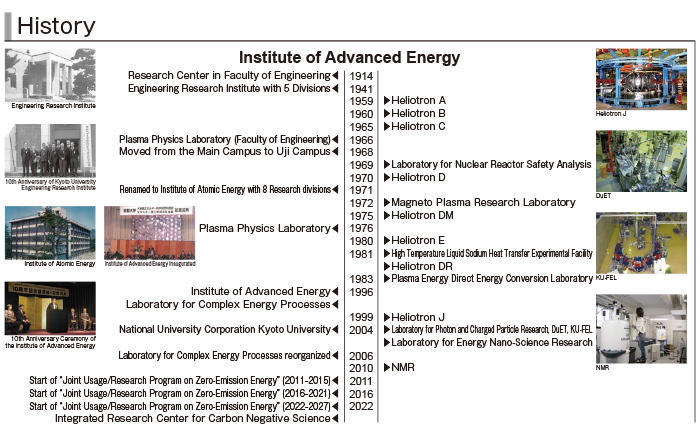History
History and Development
The Institute of Advanced Energy (IAE) was founded on 11th May 1996 by consolidation of the Institute of Atomic Energy and the Plasma Physics Laboratory. IAE operates with the objective of exploring the energy systems for the next generation, primarily by investigating the basic principles of nature and by developing state-of-the-art technologies to utilize these principles for practical applications in the society.
The roots of IAE date back to the Engineering Research Institute, established in 1941, to carry out synergetic studies of engineering through the cooperative work of specialists in different scientific fields. The Engineering Research Institute was reorganized into the Institute of Atomic Energy in 1971 to seek the applications of atomic energy for the benefit of mankind/humankind and brought various fundamental research achievements in the nuclear energy and related engineering disciplines.
The rapid expansion of research directions at the Institute of Atomic Energy to various fields of energy science, such as the systems engineering for social and environmental energy, the advanced energy conversion research in quantum engineering, the physical chemistry and the materials science, ultimately transformed into a new institute, IAE.

IAE at present
In IAE, 14 research sections are organized under three divisions, each dedicated to one of the following three basic processes: generation, conversion, and utilization of energy. The institute has set up the Laboratory for Complex Energy Processes with two research sections, and this laboratory promotes collaboration between researchers to address issues related to complex energy processes.
The two core research areas of the institute are "Plasma and Quantum Energy Science" and "Soft Energy Science". The former deals with energy generation via nuclear fusion on Earth, similar to that on the Sun. The latter investigates the nature's law of highly efficient energy conversion and utilization, which led to the creation of biosphere on Earth by utilizing solar energy, based on the principles of bioscience and materials science. We actively promote the internationalization of research and return our research benefits to the society through industry-academia-government collaboration. The institute also involves in educational activities at the Graduate School of Energy Science, and the Institute for Liberal Arts and Sciences to formulate and enact the curriculum for students and to train young researchers in the leading research environment.
The institute was certified as a "Zero-Emission Energy" Joint Usage/Research Center by the Ministry of Education, Culture, Sports, Science and Technology (MEXT, Japan) in FY2011, and has been keeping this status for the second time since FY2022. As the research hub of Zero-Emission Energy, we collaborate with domestic and overseas researchers over a broad spectrum of academic fields, as well as promote the share-use of cutting-edge research equipment to strengthen the foundation of academic research and to accelerate novel scientific research. Further, the institute collaborates with the Kyoto University Research Coordination Alliance including the research institutes/centers of the Kyoto University, promotes the share-use of research infrastructure through the Uji Campus Base of Equipment Support, and encourages overseas research and educational activities at the International Advanced Energy Science Research and Education Center of the Graduate School of Energy Science.








